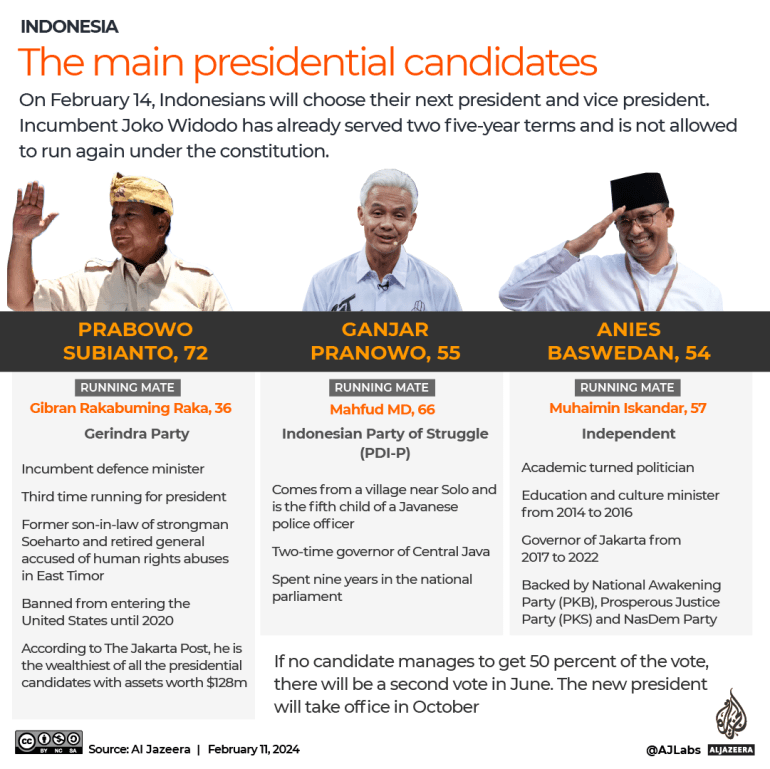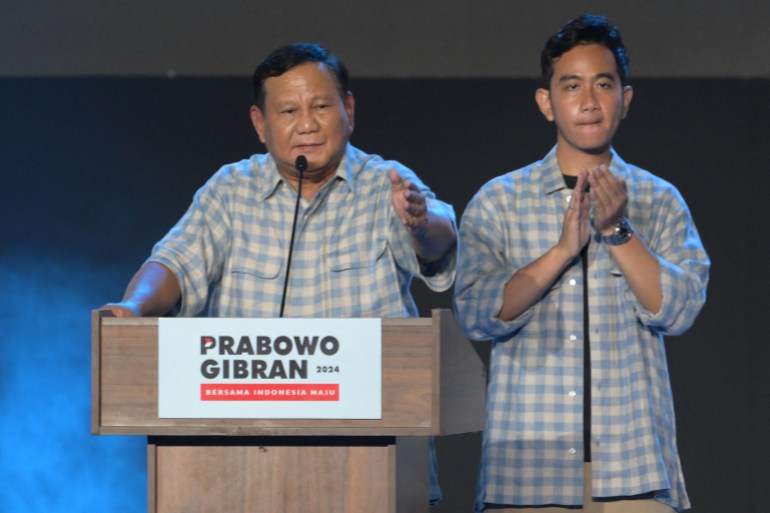Sample counts show defence minister winning about 58 percent of the vote in first round of presidential election.
Indonesian Defence Minister Prabowo Subianto has declared victory in the presidential election after unofficial vote counts showed him with a significant lead ahead of his rivals.
The 72-year-old former special forces commander, who had run for president twice before, had about 58 per cent of the votes according to four pollsters, based on “quick count” ballots at samples of voting stations nationwide. The number of ballots tallied ranged from about 86 to 95 percent as of 14:00 GMT on Wednesday.
Rivals Anies Baswedan and Ganjar Pranowo trailed with about 25 percent and 17 percent, respectively, according to the independent pollsters conducting the counts, which have provided an accurate picture of the results of previous presidential elections held in the country since it began direct voting in 2004.
A preliminary count by the election commission was far slower and showed Prabowo securing 57.7 percent of votes with about 6 percent of ballots recorded.
Prabowo addressed his supporters after announcing his success and said he was “grateful” for the quick results.
“We should not be arrogant, we should not be proud, we should not be euphoric, we still have to be humble, this victory must be a victory for all Indonesian people,” he said in a speech broadcast on national television.

Ganjar and Anies urged the public to await the official result, which is expected by March 20 at the latest . Their campaign teams said they were investigating reports of electoral violations, both calling it “structural, systematic and massive fraud” without providing evidence to back up their claim.
To win in a single round, a candidate needs more than 50 percent of votes cast and at least 20 percent of the ballot in half of the country’s provinces. If no candidate wins a majority, a runoff between the top two finishers will be held in June.
The election pitted the two popular former governors against the pre-election frontrunner Prabowo, who crucially had the backing of the popular incumbent Joko Widodo.
Widodo bet on Prabowo as a continuity candidate to preserve his legacy, including a role for his son Gibran Rakabuming Raka as the defence minister’s running mate.
Now, his successor will inherit an economy with impressive growth and ambitious infrastructure projects, including transferring capital from Jakarta to the island of Borneo.

However, some critics have accused Widodo of trying to build a political dynasty despite him being the first president to emerge from outside the political and military elite since the 1998 end of the dictatorial rule of Suharto, whom Prabowo served as military commander for.
Prabowo was discharged as commander of the army’s special forces, called Kopassus, in 1998 after claims that the group kidnapped and tortured political opponents of the former dictator.
Ian Wilison, a senior political lecturer at Murdoch University’s Indo-Pacific Research Centre in Australia, told Al Jazeera that the former commander changed his approach during this election.
“He targeted a younger demographic by remaking his image through cartoon figures, as a cuddly uncle, casting a kind of a doubt over his human rights record, which for a younger generation is sort of an ancient history for the most part,” he said.









